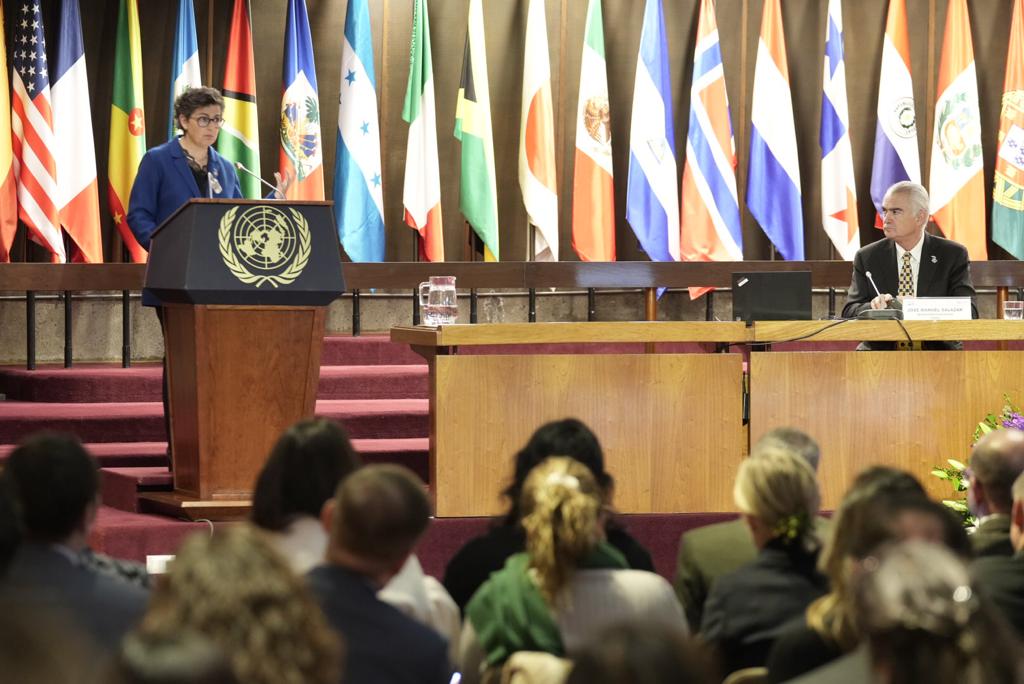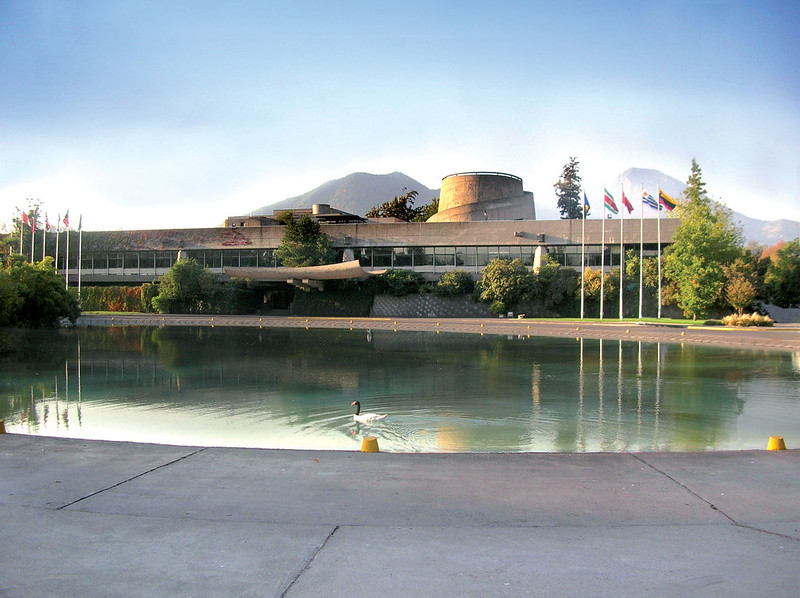Arancha González Laya Urges for Promoting a New International Trade System that is More Inclusive and Ensures Better Distribution of its Costs and Benefits
The Dean of the Paris School of International Affairs and former Minister of Foreign Affairs, European Union and Cooperation of Spain kicked off today a series of Keynote Lectures organized in the framework of ECLAC’s 75th anniversary commemorations.

The Dean of the Paris School of International Affairs (PSIA) at the Paris Institute of Political Studies (Sciences Po), Arancha González Laya, urged today for promoting a new international trade system that would be more inclusive and ensure better distribution of its costs and benefits, during a keynote lecture she gave at the headquarters of the Economic Commission for Latin America and the Caribbean (ECLAC) in Santiago, Chile, where she was received by José Manuel Salazar-Xirinachs, the regional organization’s Executive Secretary.
“I invite ECLAC to be a driving force for thinking up a new international economic order that would help us avoid repeating the center and periphery that marked its beginnings, and would instead allow everyone – center and periphery, north and south – to be able to improve their citizens’ lives through the economy, international trade and regional integration,” she underscored.
The former Minister of Foreign Affairs, European Union and Cooperation of Spain gave a lecture entitled “Globalization, regionalization and the challenges of Latin America and the Caribbean’s economic integration,” which kicked off a series of Keynote Lectures organized in the framework of ECLAC’s 75th anniversary commemorations.
“We are heading into a new world with the fight for global hegemony as the backdrop. A world in which closing, rather than opening, is emerging as the main rule,” she warned in her speech.
She noted that the international economic order has taken beatings and undergone transformations. The first was the 2008 financial crisis, which left major scars in terms of inequality and exposed the enormous flaws of a system that was open but had insufficient regulation.
“We must strive for a new international consensus on trade and the economy, which are being affected today by the risk and cost of a new type of exclusion, of another geopolitical fragmentation,” she asserted.
“This is the time for ECLAC to again show that leadership capacity for imagining the international economic system. It is important to keep forging international agreements to manage our interdependence and to do so multilaterally,” she added.
Arancha González Laya stressed that the multilateral system may no longer have the mission of fostering convergence but rather of helping to manage the risk of divergence, of preventing trade differences or disputes from turning into trade wars.
She argued that the multilateral trading system will have to strike a new balance on three critical matters: national security, state subsidies, and the conflict resolution system.
“These rules will probably be more flexible than they are today, but we need them, because without them we cannot guarantee equal opportunities for all members of the international community in the economy. We will therefore be creating a new center, with a new periphery,” she stated.
The Dean of the Paris School of International Affairs emphasized that measures must be implemented so that trade can benefit everyone.
“This is about making public policies coherent. Many of our economies’ problems are not due to their trade policies but have much to do with the absence of other policies: fair taxation, quality education and training, social protection networks for citizens that today also face this huge challenge of the technological, climatic and geopolitical transformations in our economies and must be able to navigate them; or open industrial policies that would ensure investment without skewing the playing field,” she underlined.
Upon inaugurating the lecture, ECLAC’s Executive Secretary, José Manuel Salazar-Xirinachs, highlighted that in this year of 75th anniversary celebrations for the regional commission, it is very appropriate to start the Keynote Lecture series with the presentation by Arancha González Laya on Globalization, regionalization and the challenges of Latin America and the Caribbean’s economic integration – not only because of the major changes taking place in the world and in globalization, but also because this is a topic that has been central to ECLAC’s concerns historically.
“From the beginning, ECLAC not only analyzed but also theorized about the nature of the global economic system, starting with the well-known model of center and periphery, followed by the theories of dependency and other approaches, and it made practical recommendations about how to improve the global economic system, both in terms of trade and financial matters, to make it more amenable to the development aspirations of Latin America and the Caribbean, and to developing countries overall,” he affirmed.
The senior United Nations official emphasized that the lecture series kicked off today will not only celebrate major contributions of the past but will also enable reflections on the current and future challenges faced by the region and by ECLAC.
“We have invited eminent thinkers to join us until the commemorative period concludes in February 2024, with the aim of sharing topics and new perspectives to guide renewed dialogue and thinking about the coming years for the region and the organization,” he added.
Finally, ECLAC’s highest authority announced that all the keynote lectures will be compiled in a book commemorating the commission’s 75th anniversary, which will be published in mid-2024.
Related content

ECLAC Celebrates 75 Years with a Commitment to Continue Working for a More Productive, Inclusive and Sustainable Future for Latin America and the Caribbean
The United Nations regional organisation, which has a variety of commemorative activities planned throughout the year, launched a website that explains its origins, the evolution of its thinking and…
Related link(s)
Country(ies)
- Latin America and the Caribbean
Contact
Public Information Unit
- prensa@cepal.org
- (56 2) 2210 2040
